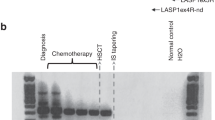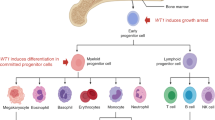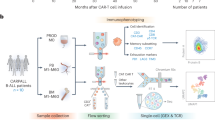Abstract
The WT1 gene is expressed in 73–100% of patients with acute myelogenous leukemia (AML) and is thought to play a role in maintaining the viability of leukemic cells. WT1 has been proposed as a marker for minimal residual disease in leukemia. We obtained serial blood or bone marrow samples from patients with de novo AML at diagnosis, during therapy, and up to 95 months after diagnosis and analyzed for WT1 gene expression by RT-PCR to determine whether gene expression was predictive of relapse. Forty-four patients had WT1-positive AML and achieved a complete remission (CR) following chemotherapy and 24 patients underwent unrelated donor (n = 4), sibling donor (n = 13) or autologous (n = 7) marrow transplantation. After achieving CR 62% of the patients became WT1-negative, while 38% remained WT1-positive. There was no difference in the disease-free survival (DFS) and survival from remission between WT1-positive and -negative patients (P > 0.1). Following BMT, 32% of the patients analyzed in CR within the first 100 days after transplantation were WT1 PCR positive. Detection of WT1 transcripts within 100 days following BMT did not affect DFS and overall survival (OS) after transplantation (P > 0.1). Ten of 11 patients who are in continuous CR following chemotherapy or BMT for more than 3 years were transiently WT1-positive during the observation period. Four of these patients displayed the WT1 transcript at the last examination. Thirteen of 39 patients were WT1 PCR negative within 4 months before clinical onset of relapse and eight patients were WT1 PCR negative at time of relapse. These data indicate that: (1) achievement of WT1 negativity is not associated with longer DFS, survival from remission, or OS after transplantation; (2) not all patients who relapse become WT1 positive again; (3) long-term remitters frequently display the WT1 transcript. Thus, we conclude that the monitoring of WT1 gene expression by qualitative RT-PCR during treatment and CR is of very limited value.
This is a preview of subscription content, access via your institution
Access options
Subscribe to this journal
Receive 12 print issues and online access
$259.00 per year
only $21.58 per issue
Buy this article
- Purchase on Springer Link
- Instant access to full article PDF
Prices may be subject to local taxes which are calculated during checkout
Similar content being viewed by others
Author information
Authors and Affiliations
Rights and permissions
About this article
Cite this article
Gaiger, A., Schmid, D., Heinze, G. et al. Detection of the WT1 transcript by RT-PCR in complete remission has no prognostic relevance in de novo acute myeloid leukemia. Leukemia 12, 1886–1894 (1998). https://doi.org/10.1038/sj.leu.2401213
Received:
Accepted:
Published:
Issue Date:
DOI: https://doi.org/10.1038/sj.leu.2401213
Keywords
This article is cited by
-
Role of minimal residual disease in the management of acute myeloid leukemia—a case-based discussion
Annals of Hematology (2018)
-
WT1 Expression in Adult Acute Myeloid Leukemia: Assessing its Presence, Magnitude and Temporal Changes as Prognostic Factors
Pathology & Oncology Research (2016)
-
Overview of Therapy and Strategies for Optimizing Outcomes in De Novo Pediatric Acute Myeloid Leukemia
Pediatric Drugs (2014)
-
High WT1 mRNA expression after induction chemotherapy and FLT3-ITD have prognostic impact in pediatric acute myeloid leukemia: a study of the Japanese Childhood AML Cooperative Study Group
International Journal of Hematology (2012)
-
Wilms' tumours: about tumour suppressor genes, an oncogene and a chameleon gene
Nature Reviews Cancer (2011)



